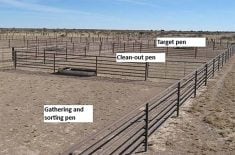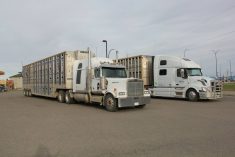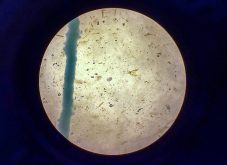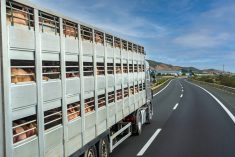A consensus is emerging in Ontario that animal welfare regulations aren’t working.
The Ontario Federation of Agriculture, Food and Farm Care Ontario and the Canadian Federation of Humane Societies say the current system is unsustainable and should be amended.
Under the current system, the Ontario Society for the Prevention of Cruelty to Animals handles animal welfare inspections and enforces provincial regulations.
However, Crystal Mackay, executive director of Food and Farm Care Ontario, said the system is unsound, mainly because the SPCA is a charitable organization with the unusual mandate of law enforcement.
Read Also

Beef cattle more prone to trace mineral deficiencies
The trace mineral status of our cows and calves is a significant challenge for western Canadian producers and veterinarians.
“It would be like your provincial police force having to fundraise,” said Mackay.
Ontario farmers have accused the SPCA of abusing its policing authority to generate newspaper headlines about livestock cruelty cases. Those headlines, in turn, garner funds for its cause.
The OFA, while not going that far, said the SPCA has harassed its members and wants the province to amend the legislation that governs the animal welfare group.
“We believe farmers are being unfairly targeted while using standard animal care practices,” the OFA said in a news release.
“Some are vulnerable to unwarranted farm inspections and even harassment.”
In response to these concerns, MPP Jack MacLaren introduced a private member’s bill in March to amend the legislation.
Bill 47 would strip the SPCA of its power to enforce animal welfare regulations on livestock, instead handing that role to the provincial agriculture ministry. As well, SPCA officers wouldn’t be able to lay charges of animal abuse or neglect. Only regional and provincial police would have the power to lay charges.
The proposed bill outraged animal rights groups in Ontario, who said it would push animal welfare in the province back into the dark ages.
The bill failed to pass second reading in the legislature in late March, but Mackay said it shone a needed spotlight on the issue.
“The status quo isn’t a good option,” she said.
“From the SPCA’s point of view, the concept of having to fundraise and then being responsible for enforcement and recognizing how specialized livestock production is today, it’s a tough job for them.”
The local SPCA is responsible for animal welfare inspections in most provinces, said Shelagh MacDonald, program director with the Canadian Federation of Humane Societies. SPCA staff act as peace officers and have the authority to enforce animal welfare regulations, including the power to seize livestock.
It may be common practice in animal welfare, but MacDonald said few charities have policing powers in Canada.
“I think it’s an interesting system, and I think it is becoming more in question…. We have charitable organizations that are doing law enforcement work. That doesn’t happen in any other sector of our society,” she said.
“I think it needs improvement. Law enforcement should be funded by the government. In most provinces, there are some provincial funds to assist with training of inspectors … but not the operating cost and caring for the animals.”
The system may not be perfect, but MacDonald said that doesn’t mean the SPCA harasses farmers or abuses its power to reap publicity.
Its first priority is to educate pet and livestock owners on acceptable practices rather than seize animals or lay charges, she added.
“I think there is this perception that the SPCAs are out there just trying to get everybody they can and seize all these animals. That is just not true,” she said. “They operate mostly as a complaint basis, when somebody has a concern.”
Mackay said the province should form a taskforce that comprises the SPCA, government and industry representatives to find a “made in Ontario” solution to the problem.
A potential solution might be to borrow from Manitoba’s system, where government employees enforce animal welfare laws.
“We think there are some good models, including the Manitoba option,” she said.
“You’ve got veterinarians and ministry of agriculture staff responding to farm calls, (which) I think is a really responsible approach.”















